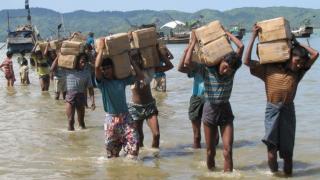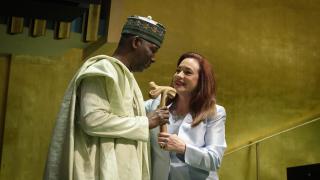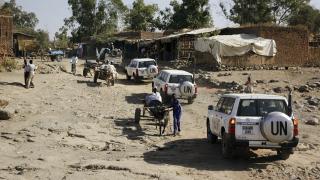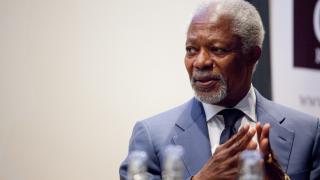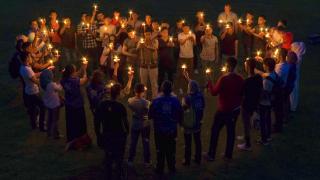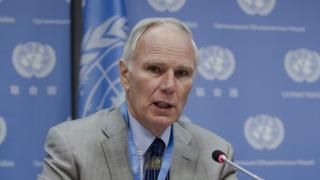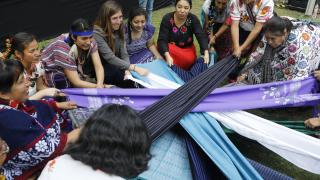
On 10 September, UN Secretary-General Antonio Guterres published his much anticipated report: Our Common Agenda. You can watch live here.
Every year, around 400 reports are issued in the Secretary-General’s name. But this one was billed as standing above the rest. Mandated by the General Assembly’s Declaration to mark the UN’s 75th anniversary, Our Common Agenda sets out a vision for a better, more sustainable and peaceful future; and for more effective, inclusive and networked multilateralism.
It draws on feedback received from stakeholders over the past two years - including through an ambitious global crowdsourcing exercise and innovative digital consultation, to which UNA-UK contributed. In this UN briefing, we take a look at the process that led to the report, why it matters, what’s in it, and what we hope it means for the future of the UN.
Background
Last year, the UN conducted a global listening exercise to mark its 75th anniversary. Over 1.5 million people and 60,000 organisations from 195 countries took part in the “largest ever global conversation” sharing their priorities for the future and ideas on strengthening multilateralism.
The UN75 consultation showed that demand for global solutions is high: over 97% of respondents said international cooperation was vital. So is support for the UN - across all regions and social groups. Yet respondents were clear that our global system, and the UN in particular, must become more open and inclusive. The vast majority of proposals received called for stronger partnerships on the ground and greater inclusion of stakeholders in decision-making, especially civil society and youth.
In parallel, Member States adopted a Declaration to mark the anniversary and set a vision for ‘the future we want, and the United Nations we need’, based around 12 areas of action that can only be addressed through reinvigorated multilateralism.
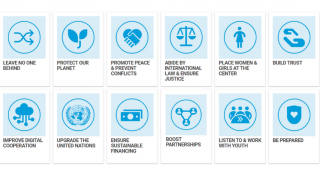
They committed to listening to the outcomes of the UN75 global conversation, and asked the Secretary-General to “report back with recommendations to advance our common agenda and to respond to current and future challenges”.
To inform this report, the Secretary-General sought input from a broad array of stakeholders, including Member States, thought leaders, young people, civil society, local governments, parliamentarians and others. This included a digital consultation facilitated by one of UNA-UK’s partners, the Brazil-based Igarapé Institute.
UNA-UK has been supporting the above processes for the past three years, given our longstanding objective of making the UN more open, inclusive and accountable to the people it serves.
In 2018, we co-founded the Together First initiative, joining with over 200 organisations across the world who share this vision. We began lobbying for the UN’s 75th anniversary to be more than a commemorative exercise. Rather, we called on states to make this the starting point for transforming our global system. We were pleased that our efforts helped to secure an inspiring theme for the anniversary - the future we want, and the United Nations we need - as well as plans for an outcome document.
We then launched a consultation to inform that outcome document, by crowdsourcing solutions to global catastrophic risks, which resulted in 10 proposals for action. We also contributed ideas to the UN75 listening exercise and the digital consultation - both featured a number of our proposals - and urged the UN leadership and Member States to ensure these long consultation processes delivered concrete results, including on engaging with civil society.
Why it matters
Humanity faces unprecedented and existential challenges. The UN and Member States must respond in kind - moving beyond warm words about the value of multilateralism and making good on the oft-repeated pledge to end “business as usual”. The Secretary-General’s global conversation demonstrated a clear appetite, in all regions of the world, for transformative action to tackle the multiple crises threatening to reverse the progress of the past 75 years. It also showed that people do not want a return to the status quo, which has left the majority of the world’s population behind.
The crises we face require urgent action. The impacts of COVID-19 will continue to unfold and increase in 2022. Time is running out to address the climate crisis and - at the start of the Decade of Action for the SDGs - the Goals are even further off track. We cannot afford another long deliberative process. We must build on the work done to date, including through the UN75 global conversation.
This report has the capacity to serve as a launchpad for action and demonstrate that 1.5 million people were not just listened to, but that they have been heard.
What’s in it:
The report presents a stark choice to humanity - breakdown or breakthrough - stating that the choices we make, or fail to make, today could lead to a future of perpetual crisis, or a more peaceful and sustainable world for all.
It emphasises the existential need for solidarity, trust and cooperation, positioning the report as an action agenda, designed to strengthen and accelerate multilateral agreements - particularly the 2030 Agenda - and make a tangible difference to people’s lives.
Recommendations are made across four broad areas, detailed below. We are delighted that a number of them echo proposals we put forward last year.
1. A renewal of the social contract, anchored in human rights, to rebuild trust and social cohesion. Much of our global unease is rooted in persistent poverty, hunger, lack of access to health care, education and income security, growing inequalities and injustices as well as misinformation and lack of confidence in institutions. Key recommendations include:
- Tackling the “infodemic” of misinformation plaguing our world by ending the ‘war on science’ and introducing a global code of conduct that promotes integrity in public information.
- Addressing tax evasion and aggressive tax avoidance, money-laundering and illicit financial flows, through a new joint structure on financial integrity.
- Reinvigorating our thinking around human rights, including our online lives. o Achieving universal social protection coverage, including universal health care, concretized at a World Social Summit in 2025.
- Eradicating violence against women and girls and ensuring their full and equal participation, including in emergency response plans and backed by a global campaign to eliminate damaging social norms.
- Correcting blind spots in how we measure progress and prosperity by introducing measures that complement the gross national product (GDP), and ensure profits do not come at the expense of people and planet.
2. A focus on the future, through a deepening of solidarity with the world’s young people and future generations. Those that inherit the consequences of the decisions we take today are barely represented in decision-making which is heavily weighted towards the short term. Key proposals include:
- Transformative measures on education, skills training and lifelong learning, including a Transforming Education Summit in 2022.
- A Futures Lab to take full advantage of our unprecedented capacity to predict and model the impact of policy decisions over time.
- The appointment of a Special Envoy for Future Generations to serve as a voice for the 10.9 billion people expected to be born this century, as well as an upgraded UN Youth Office.
- The repurposing of the Trusteeship Council to make it a deliberative body on behalf of succeeding generations.
- A Declaration on Future Generations
3. Urgent action to protect and deliver global commons - high seas, the atmosphere, Antarctica and outer space - and global public goods – such as peace, economic security, and global health. To achieve this, we need a multilateralism that is more networked, inclusive and effective. Key recommendations include:
- Immediate steps for a global vaccination plan for COVID-19 and better integration of the global financial system with other decision-making processes through a Biennial Summit between the G20, ECOSOC, the Secretary-General and heads of international financial institutions.
- Better preparedness for future global shocks through an Emergency Platform that would be triggered automatically in response to large-scale crises.
- A Summit of the Future to forge a new consensus on the most critical global concerns that the international system must protect and deliver– including peace, climate action beyond 2030, the digital commons and outer space.
- A High-level Advisory Board, at the head of State/Government level, to inform the Summit of the Future and advance governance in the areas of greatest concern.
4. An upgraded UN that is fit for a new era – one that can offer more relevant, system-wide, multilateral and multi-stakeholder solutions to the challenges of the 21st century. The transformation will be driven by data, innovation, strategic foresight, predictive analysis and behavioural science. Key proposals include:
- Strengthening the UN as a source of reliable data and evidence
- Deepening engagement with local and regional governments, civil society, parliaments and the private sector.
- The establishment of a civil society focal point in every UN entity (that doesn’t already have one)
Next steps:
UNA-UK is delighted that the report calls for a Summit of the Future to be held in 2023. This was a key element of our advocacy work, along with partners in our Together First network.
We urge Member States to support the recommendations contained in the report, and to take action to move forward on an intergovernmental process - or processes - culminating in 2023. UNA-UK stands ready to work with its public and civil society networks across the world to support the implementation of much-needed action to build the future we want, and the global system we need.
Photo: Tlalmanalli Ð indigenous ceremony opens Generation Equality Forum in Mexico. Credit: UN Women/Paola Garcia

